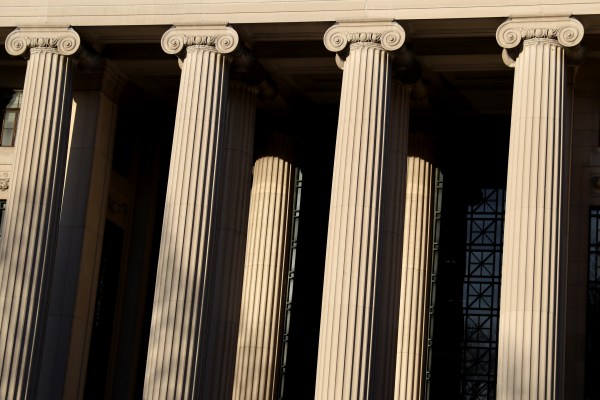I’ve been writing about Mormons—members of the Church of Jesus Christ of Latter-day Saints have grown uncomfortable with that word—in U.S. politics for a long time, and I still haven’t really answered my first question:
Is there an LDS voting bloc?
In general, LDS voters (I will not type “LSD,” I will not type “LSD,” I will not type “LSD”) look politically a lot like evangelicals with similar racial, economic, educational, and geographic characteristics. While many of the more rigorously orthodox Christian communions do not think of the LDS church as being precisely Christian (what each religion thinks of the others can be a touchy subject—ask an Orthodox Jew if he thinks his Christian friends are monotheists) the LDS voter is, on paper, typically so much like a white evangelical (U.S. Mormons are overwhelmingly white and non-Hispanic) as to be politically identical.
Usually.
The 2022 midterms included some close or interesting races (some remain unresolved as of this writing) in states with substantial and politically influential LDS populations: Utah, Nevada, and Arizona. (LDS voters are a force in Idaho, too, but nothing interesting happened in Idaho this cycle.) In Utah, incumbent Republican Sen. Mike Lee faced conservative-ish, independent-ish gadfly Evan McMullin, a former Republican who was in effect the Democratic candidate in the race. Lee won, of course, but he came in with less than 55 percent of the vote—compare that to incumbent Republicans in similarly conservative states and the deficit is notable: Jim Inhofe was reelected with 62.9 percent of the vote in Oklahoma in 2020, and Lee himself won 68.2 percent of the Utah vote in 2016. McMullin’s charge against Lee was that of sycophancy toward Donald Trump, up to and including indulging the president’s attempts to nullify the 2020 presidential election and thereby stage a coup d’état under legal camouflage. If Utah punished Lee for this, Utah was right to do so. McMullin, himself a member of the LDS church, was not shy about putting the argument into moral terms.
There is some reason to believe that, while they are in the main indistinguishable from white evangelical Republicans, LDS voters sometimes pull back. Professor Jacob Rugh of Princeton, who comes from a Mormon background and has studied Mormon political engagement in depth, believes that it was hesitant LDS voters—especially in and around Mesa—who cost Donald Trump the 2020 electoral votes of Arizona, a state Joe Biden won with a plurality of only 10,457 votes.
I spoke with Rugh before the midterm elections and put my question to him: Are LDS voters on the same path as U.S. Catholics, who used to be powerful voting bloc within the Democratic Party but whose political commitment was, over time, subsumed under different identities and demographic characteristics, with educated suburban Catholic voters voting more or less like educated suburban non-Catholic voters, with rural Catholics voting like rural non-Catholics, etc.? And is the situation in more heavily Mormon states different from the situation of Mormon voters in, say, Texas or Massachusetts?
Utah Mormons, Rugh argues, often vote on the “ethno-religious” model. Like American Jews, they overwhelmingly favor one political party (3 out of 4 Jewish Americans voted Democrat in the midterms). In the case of LDS voters, Rugh says, the strong affiliation with the Republican Party tapers off, as one might expect, among less observant voters and younger voters. Rugh’s research found that 6 in 10 young LDS voters opposed Trump in 2016 and three-quarters opposed him in 2020. In Rugh’s 2020 survey of BYU-educated voters, Trump didn’t even receive majority support from any subgroup: not whites, not men, and not—notably—self-identified Republicans. Those are interesting findings, but how much they mattered to the outcome in 2020 is not clear: Trump won 58 percent of the vote in Utah, substantially more than he did in conservative Texas (52 percent), though a good deal less than he won in Wyoming (70 percent) or Alabama (62 percent). How this is playing out in 2022 is even less clear.
“My sense is that in Nevada the Republican candidates they put up are stronger and less crazy than in Arizona, so it is reverting back to normal partisanship. You won’t see as much crossover from people being anti-Trump—it’s more like a pre-Trump matchup. But in Nevada, they’re not as Republican as in Utah,” Rugh says.
And that last part is what really seems to matter most. “Most of the research on white evangelicals holds true in the LDS case,” Rugh says. “Party is the super-identity, and it will override the other stuff. That’s sad for me as an LDS Democrat.”
The emergence of political party as the key tribal indicator is a much-remarked-upon feature of our time. In some ways, it is almost encouraging: The number of people who say they would be troubled by their children marrying a member of the rival political party now outweighs the number of people who say they would be troubled by their children marrying a member of another race or a different religious group. And, in a real sense, there is some progress in that: Party identification isn’t exactly a window into “the content of their characters,” but it is more indicative of a moral worldview than is some feature that is inherited or mainly a matter of family background. That being said, it is today more seldom the case that people acknowledge the reality that there are good Democrats and bad Democrats, good Republicans and bad Republicans—party-ism can be as poisonous and irrational a form of bigotry as any other. Though I am not persuaded by LDS claims about the ultimate questions, I am sure that I believe that the displacement of religion by politics in our national moral life—which in practical effect has meant the transmutation of politics into a religion—is a positively catastrophic development.
When I hear someone describe himself as a “Christian nationalist,” I think: You have one more adjective there than you really need. It is not that I believe that there is in most cases some straight line that one can draw from Christian belief to a political position: The command to feed the hungry is not necessarily a command to build a gigantic expensive government bureaucracy to oversee programs intended to feed the hungry, just as not every rule of personal discipline ought necessarily to become a statute. (Some should, some shouldn’t. It’s complicated.) But if Christ is sufficient, as Christians believe, then that which is Christian is sufficient, too—even though it requires the very difficult work of discernment and prudent consideration. Moral education and religious education, which must necessarily precede political education, are hard—they require work.
In a recent sermon, my friend David Rea, who is the pastor at Providence Presbyterian Church in Dallas, mentioned an episode of the Joe Rogan podcast in which Rogan and Douglas Murray gleefully mocked the biblical story of Elisha sending down the she-bears to maul his critics. As David pointed out, both Rogan and Murray entirely misunderstood the story, from the nature of its characters to the lesson it is meant to teach. Rogan one can make some accommodation for—he isn’t dumb, but he is a lightly educated meathead known to the world mainly because of Fear Factor. Murray is a graduate of Oxford’s Magdalen College, where I suppose they still learn enough scripture to know who it is the school is named for. But you can’t educate a man against his will.
You can pull anything you want out of the Bible—the Bible is famous for that. I recently received a press release that reads, in part:
When asked to identify the nation’s most appropriate determinant of right and wrong, regardless of people’s religious faith, forty-two percent (42%) suggested that “what you feel in your heart” is the best guide, compared to twenty-nine percent (29%) who said we should base morality on majority rule and an equal number (29%) who look to principles taught in the Bible.
What you have there is a multiple-choice question in which every answer is wrong: Unless you are unfortunate enough to be one of those imbeciles who insists he has “no regrets,” then you know that what you feel in your heart at any given moment is bound to be wrong and should usually be treated with suspicion; unless you are one of those unfortunate idolators who have deified We the People, then you know that majority rule is wrong more often than it is right, and that we practice limited majoritarianism because it is the only workable substitute to tyranny or war. As Joe Rogan’s conversation with Douglas Murray reminds us, even a very refined Oxford scholar is entirely capable of misreading the Bible and misapplying its principles. We understand that one needs a great deal of education to be a good historian or a good physician, but we ignore that one needs a great deal of education to be a good citizen, a good father, a good mother, a good neighbor, or a good friend.
Naturally, we have followed this road to its inevitable dead end, the belief that all you really need is to be a good Republican or a good Democrat.
In Other News ...
My first presidential vote was for Andre Marrou. Now, there was an LSD voter for you. I eventually gave up the psychedelics. And voting.
Economics for English Majors: Substitutes
Why are most computer printers terrible? Why is it that even the good ones are not usually very good? Why is it that, on the other hand, most mobile phones work really well, even the cheap ones?
The answer can be found in part in two of the concepts we discussed last week: elasticity and substitutes. Last week’s discussion of elasticity necessitated some discussion of substitutes; this week’s discussion, which is focused on substitutes, will necessitate some additional discussion of elasticity. And the mysteries about each will be illuminated.
There’s a story about Abraham Lincoln being served a not very good breakfast beverage and telling the server: “If this is coffee, then I would like some tea; if this is tea, I would like some coffee.”
Coffee and tea are the econ-textbook examples of substitutes or substitutable goods, though I don’t know why: Nobody drinks tea for breakfast except Canadians and Anglophiles. (Yeah, okay, a couple of billion people in India and China, too, I guess. And the Irish. Russians, too, I suppose.) But the idea is that if there isn’t any coffee, or if coffee is too expensive, some coffee drinkers will switch to tea, or vice versa. If the price of beef goes up, maybe you eat more chicken. If Honda raises its prices, maybe you switch to Toyota. The classical economics test for whether goods are substitutes is when the demand for one goes up when the price of the other rises.
We normally think of substitution at the consumer and household level, but it goes all the way up the economic chain. For a long time, many commercial users chose diesel-powered vehicles because they were more economical than gasoline-powered vehicles, but recent high diesel prices have the vector of substitution pointing the other way. Likewise, electric vehicles are for many drivers a perfectly workable substitute for gasoline vehicles, but when gasoline was very cheap, there was not much economic incentive to choose electric. Higher gasoline prices have, depending on how you look at it, either increased the substitutability of gasoline and electric vehicles or revealed the previously underappreciated substitutability. Automation is what happens when businesses substitute capital for labor, investing in machines to do work rather than paying workers to do that work—another substitution that makes itself more obvious when prices—in this case wages, the price of labor—go up: Businesses tend to invest much more in labor-saving technology when wages are rising. Household-level substitution can happen quickly, even on the fly when comparing prices at the grocery store. Industrial-scale substitution can take a long time and impose a very high economic price because of transaction costs: If you automate some labor-intensive task, the machinery itself costs money to purchase and install, but you also incur many direct and indirect expenses related to the planning and transition for such a project.
Some goods are not substitutes. No matter how high the price of oranges gets, thermometers and submarines and watercolor portraits are never going to be substitutes for fruit. It’s apples and oranges, not airplanes and oranges. Some goods are in effect the opposite of substitutes, and these are called complementary goods. Complementary goods are goods that go together in terms of demand: Walmart started selling more bananas when it started putting some of them on the milk aisle, because people who buy milk also buy bananas. (The connector there is breakfast cereal, apparently.) If the price of peanut butter goes up, demand for peanut butter goes down—but demand for jelly and bread may go down, too. Automobile makers, who typically earn bigger profit margins on trucks and SUVs, do not like to see the price of gasoline and diesel go up very much—people who are hurting from high fuel prices are not typically in the mood to buy a new F-350. If there’s a downturn in the paint market, there’s also likely to be a downturn in the paintbrush market, the paint-remover market, the painters’ tape market, the drop-cloth market, etc.
Some goods are so complementary that businesses pretend to be in one business while actually making their money in the other business. Computer printers are the classic example of this: For years and years, most printers have been sold at little or no profit, or even at a substantial loss, by companies that make their money selling printer ink, toner cartridges, etc. These companies spend a lot of money in trying to ensure that they maintain semi-monopolies on compatible cartridges, and maybe don’t spend enough on developing better printers, quality control, etc. So, we have printers that are cheap but not very good, and printing supplies that are relatively expensive. That’s how that business works—not very well. The surest route to success is keeping substitutes off the market and thereby preventing consumers from having much in the way of real market choice.
The mobile phone business is similar in some ways but different in important ways. Mobile phone manufacturers will be happy to sell you a phone at the full price, but most people get their phones at a steep discount—or for free (“free”)—from service providers. Like printer manufacturers, they make little or no money, or may even take a loss, on the equipment they sell, but they try to make it up and then some through ongoing purchases of the stuff that’s needed to make the equipment do what it is supposed to do: ink cartridges in the case of printers, cellular service for phones. The important difference in the way the industry is structured is that the big cellular-service companies are not major equipment manufacturers, and the people who make phones are mostly not in the service business as well: Apple wants you to buy an iPhone, and AT&T wants you to sign up for their plan, but there’s some distance there. More important, there are lots of substitutes on both sides of the equipment/service equation: You can get lots of different service plans if you have an iPhone, and you can get lots of different phones if you have AT&T. For comparison: Imagine what the automobile market would look like if a BMW would only run on BMW-brand gasoline or if the pumps at different gas stations only worked for certain brands of cars.
Incompatible chargers are going to be a challenge for the electric-car market; incompatible chargers are going to be less of a challenge for the mobile-phone market, at least in the European Union, where the regulators have mandated a single charging standard USB Type C. How an industry structures itself—and how regulation shapes that—can be tricky from the point of view of maximizing substitutability. The best markets are the ones in which there are lots of sellers and lots of buyers, lots of repeated interactions, and lots of choices. From one point of view, the EU regulators are (or think they are) working to maximize consumer choice, but ensuring that consumers can use the chargers they already own with any device rather than being locked into a charger purchase when they buy a new device. From another point of view (mine), consumers are having a choice taken away from them—it's USB Type C or nothing as far as the European Union is concerned.
Presumably, if consumers really wanted better printers and were willing to pay for them, somebody would make one. But there often is a big difference between our stated preferences and our revealed preferences—between what we say we want and what we actually choose when spending our own money. That holds true for all sorts of things, including political candidates, but never mind that for now.
Words About Words
Speaking of fuel—and we sure have been speaking of fuel a great deal lately!—my friend Jim Geraghty, writing in National Review, refers to the political power of the price of “regular unleaded,” meaning gasoline. I still say that, too, even though it has been 26 years since leaded gasoline has been generally sold in the United States and many drivers under the age of 40 have never seen or even heard of leaded gasoline. I sent Jim a little note about showing his age, but, since doing so, I’ve noticed that while “unleaded” has mostly disappeared from journalistic and industry usage, it remains in some signage: I spotted “unleaded” on a 7-Eleven sign this week, and I don’t think the sign was 30 years old—it’s not like I was driving on some picturesque rural stretch of Route 66: It was in Plano, Texas, one of the least picturesque places in the world.
I am a fan of anachronisms and survivals in English, so I say: Keep “unleaded.”
Elsewhere in English, a political observer writes: “DeSantis looks even stronger and Trump is loosing cache.” [Sic and sic.]
A cache is a store of something and it is pronounced cash, like money. The French-inflected word denoting prestige is pronounced ca-SHAY and is spelled cachet.
And, of course, if something is being lost, someone is losing it; if something is being set free, someone is loosing it.
Consider this week’s cache of pedantry loosed.
Elsewhere
Meet the mayor of Fort Worth, Mattie Parker, and learn why Republicans in Texas don’t generally have any better luck in big cities than Republicans do elsewhere in the country.
I don’t like revolutions, and I don’t like politicos who talk like revolutionaries. I am, you know—conservative.
When politics meets kookery—as in the attack on Paul Pelosi—it can be hard to sort out the one from the other. Consider the two attempted assassinations of Gerald Ford.
You can buy my most recent book, Big White Ghetto, here.
You can buy my other books here.
You can see my New York Post columns here.
In Closing
I have always thought it is interesting and charming that some old-school Mormons refer to those outside their church as “gentiles.” There are dozens of different American subgroups, not to mention the American people as a whole, who have identified themselves with the Israelites over the years. That hasn’t always produced the results one would desire when it comes to American attitudes toward the actual Jewish people. From Religion News:
As in the past, Jews across the country voted overwhelmingly for Democratic candidates—74% to 25% according to a new exit poll of 800 registered Jewish voters sponsored by the pro-Israel group J Street. But this year their votes were as much against something or someone—as in the case of Mastriano. The J Street poll showed that a whopping 97% of American Jews said they were concerned about antisemitism.
They also laid the blame for rising antisemitism at the feet of Trump and the Republican Party. The poll, conducted Nov. 1-8, found that 76% of Jews believe Trump and his Republican allies are directly responsible for the rise in antisemitism and white supremacy in the United States. On another question, 74% of U.S. Jews said Trump and the “Make America Great Again” movement are a “threat to Jews in America.”
“There is a new element of the Jewish vote that takes place in the aftermath of Charlottesville and Jan. 6 attack on the Capitol and the high-profile antisemitism taking place in the country right now,” said Jim Gerstein, founding partner of GBAO Strategies, which conducted the poll for J Street. “It frightens people and introduces a new dynamic.”
There are some Americans who want their fellow Americans to feel fear—and, on top of the fear, humiliation. Some of these people call themselves “Christian nationalists,” a term that is, at best, half-right.







Please note that we at The Dispatch hold ourselves, our work, and our commenters to a higher standard than other places on the internet. We welcome comments that foster genuine debate or discussion—including comments critical of us or our work—but responses that include ad hominem attacks on fellow Dispatch members or are intended to stoke fear and anger may be moderated.
With your membership, you only have the ability to comment on The Morning Dispatch articles. Consider upgrading to join the conversation everywhere.